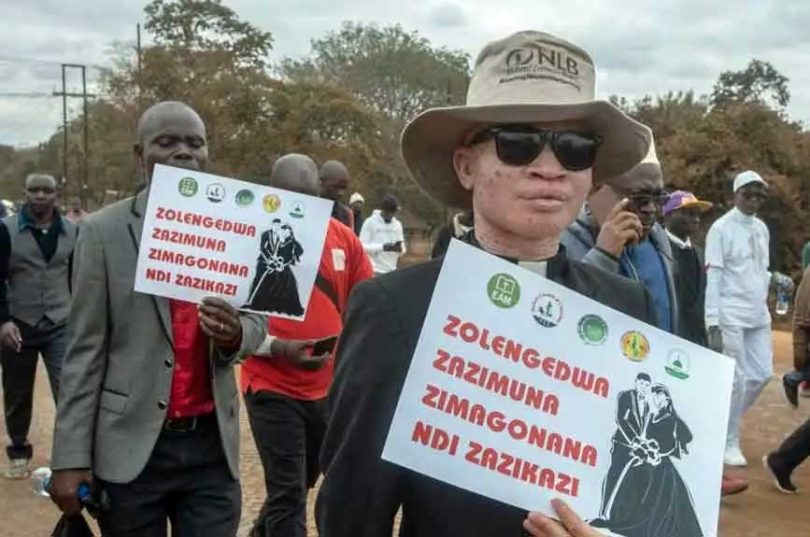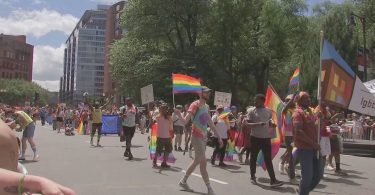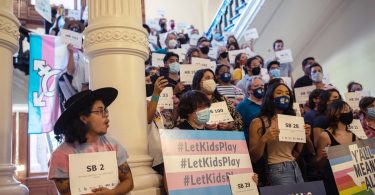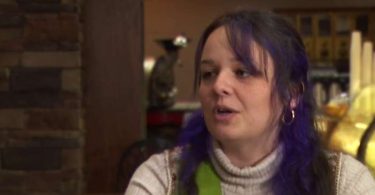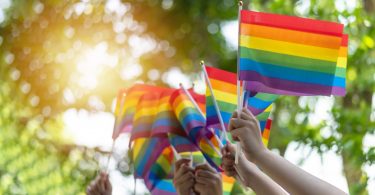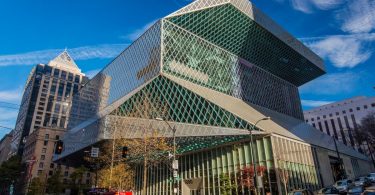Discrimination, prejudice, keep LGBT Malawians away from medical care
Religious leaders carry anti-LGBTQ signs during July 2023 march against same-sex marriage in Malawi. The climate of homophobia frequently keeps LGBTQ Malawians from accessing needed medical care. (Photo courtesy of VOA)
More than 700,000 people — the estimated 3.5% of Malawi’s nearly 21 million people who identify as LGBTQ — face discrimination when seeking health care, even though the country’s constitution guarantees the right to health for all citizens. Malawi’s High Court recently upheld the country’s colonial-era sodomy law, which criminalizes gay sex.
The website of the American radio program “The World” reports:
Out of the closet, out of care: LGBTQ communities in Malawi struggle to access health care
By Ridwan Karim Dini-Osman
In Lilongwe, Malawi, 24-year-old Cleo Jones recalls feeling more comfortable around girls than boys during childhood.
Jones came out as queer and nonbinary at the age of 15, a decision that was met with harsh rejection by their father and attacks and stigma from society, causing them to fall into periods of depression.
Since then, Jones has found a passion for helping others through community organizing. But one of their hardest challenges is a lack of access to health care.
“When you go to the hospital, especially for LGBTQ people, the discrimination starts from the gate,” they said.
Jones is among the 3.5% of Malawi’s nearly 21 million people who identify as LGBTQ and who often face discrimination, even though the country’s constitution guarantees the right to health for all citizens regardless of sexual orientation or gender identity.
Jones says they once visited a clinic in Lilongwe with a friend for an HIV test, but instead of medical care, they faced religious rhetoric and heckling.
“They wanted us to repent and say we receive Jesus Christ as our Lord and personal savior. And because we said no, they never offered the services,” Jones said.
They left the clinic feeling bullied and dehumanized, even traumatized.
Avoiding treatment
The United Nations has found that stigma and discrimination in health care settings around the world often lead to higher mental health risk and underutilization of HIV/AIDS treatment and prevention services for LGBTQ people.
Meanwhile, Malawi’s medical and nursing schools provide no training on health care for LGBTQ people, according to research done in 2016 by the Centre for the Development of People (CEDEP).
“Even the service providers themselves have no knowledge on how they can support [LGBTQ] members when they come to the facility,” said Maria Ngulube, the project lead at CEDEP. “So, there was discriminatory treatment and lack of confidentiality, which deterred LGBTQ people from seeking the health services they require.’
She said what often contributes to this is health workers’ religious beliefs. She added that many of them feel conflicted.
“They feel when you are providing the services, it means you are encouraging same-sex relationships,” she explained.
Ngulube said there are now efforts to educate health professionals to recognize the differences in care. CEDEP has implemented a training program in four districts for nurses and medical professionals since 2017, training more than 300 health workers from public hospitals.
Because there are only a few public hospitals in Malawi, the majority of LGBTQ people end up trying to access health care at Christian-based facilities. And Ngulube said those facilities have refused to answer to groups like hers on how they are implementing inclusive health care.
“As a Christian, I believe that homosexuality is a sin,” said one Lilongwe-based nurse, who preferred to stay anonymous to avoid professional repercussions. “So, you see, it’s hard to care for someone living in sin. I also do not want my colleagues to think I support this lifestyle.”
The Christian Health Association of Malawi did not respond to interview requests by The World.
Facing discrimination
In the Area 9 neighborhood of Lilongwe, 25-year-old Connex Khomba, a transgender man, said he’s also faced his fair share of discrimination.
He is an only child, and when his mother passed away two years ago, family members banned him from the funeral.
“It still pains me till today because I never had the opportunity to send off my mom,” he said.
Khomba’s mother died of cancer, so when cervical cancer awareness increased in Malawi, he decided to get screened along with another transgender friend.
“We went to the hospital. The only thing we got told is, ‘You are men. Why are you in the queue with other women to get the service?’” he said.
Like many African countries, abortion is also illegal in Malawi, except to save the life of the pregnant person. This restriction means that most abortions, including those in cases of rape, incest or severe fetal anomalies, are not legally permitted.
“I am a trans man. If I fall pregnant today, then it is something that I do not want,” Khomba said. “If the law is stopping me from freely aborting, what future does the child have?”
This is compounded by the lack of LGBTQ-specific services. There are no hospitals in Malawi that offer hormonal therapy.
“But it’s a need. For me to conform with my body, I need this service,” Khomba said.
This has compelled many people to look for these services underground.
But health experts warn that unregulated hormonal treatments can result in significant health risks like hormonal imbalances, organ damage and other severe side effects. Unregulated gender-affirming surgeries also carry a high risk of infection.
Legal hurdles
Same-sex relationships are criminalized in Malawi with a jail sentence of up to 14 years.
Malawi’s government jailed a couple in 2010 for holding a public same-sex wedding, which was later pardoned after an intervention by the United Nations.
The next president, Joyce Banda, promised legal reforms and placed a moratorium on arresting same-sex couples. But after she lost her re-election bid, the law is back in force.
Khomba wants the current law repealed. He says that many LGBTQ people who are abused, both in hospitals and elsewhere, end up suffering in silence because they can’t seek legal recourse.
But that won’t be easy, says Ben Phiri, a legislator and leading voice on sexual and reproductive health issues in Malawi.
“I would have pushed this agenda, yes. But after an election, I would be home because the community would have voted me out,” he said.
Many argue that homosexuality is a foreign lifestyle and alien to Africa, but Jones Mawerenga says homophobia, not homosexuality, is Africa’s true Western import. He teaches theology at the University of Malawi, and is the author of, “The Homosexuality Debate in Malawi.”
“There’s evidence that proves that these same-sex relations have been part and parcel of African culture way before colonization, and way before the coming of Western missionaries and Arabic missionaries who propagated Islam on African soil,” he said.
He added that British colonialism imposed Western religious and legal systems that criminalized and stigmatized LGBTQ people across many African countries. And while other southern African countries like Botswana, Mozambique and Namibia have become more inclusive, Malawi remains highly conservative.
“Even those people, the British themselves, have repealed those laws,” he continued. “They have seen their irrelevance, but us as Africans, we are continuing with those laws. We really need to start rethinking our attachments to these colonial legacies that keep drawing us back.”
Back in Lilongwe, Cleo Jones hopes that one day LGBTQ people will be treated like everyone.
Until then, the struggle continues for Malawi’s LGBTQ community as it fights for both legal recognition and societal acceptance.

